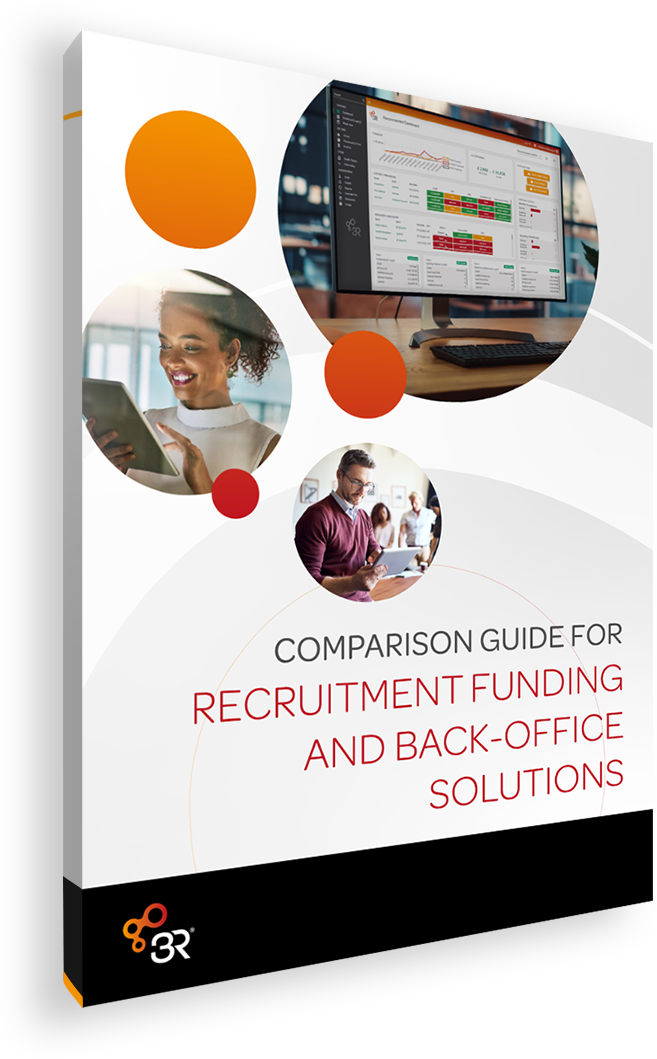Tax advice for SME recruitment agencies

Like every other business in the UK, SME recruitment agencies must navigate the tax requirements applicable to their sector and business model. However, recognising the inevitability of taxation doesn't mean resigning yourself to its burdensome weight. Rather, it underscores the importance of strategic planning to ensure compliance, efficiency, and optimal financial health.
As the owner of an SME recruitment agency, it is essential to keep yourself up to speed with the nuances of taxation. As important as fulfilling your obligations to HMRC is, it's equally important to leverage solid tax strategies to help you grow your business. Being tax-efficient isn't just about minimising your tax bill; it's about ensuring that every penny spent on tax works to benefit your company's growth and sustainability.
Whether you're a partnership or a limited liability company, you’ll need to keep on top of the best ways to relieve your tax burden and capitalise on tax benefits. From navigating dividend taxation to optimising your personal tax allowances, being astute with tax planning can significantly impact your bottom line.
In this article, we'll cover the following topics:
- Common tax management approaches for SME recruitment agencies in the UK
- Different types of tax allowances and tax breaks that are available
- How to stay abreast of regulatory changes
- How to build a robust financial framework that fosters growth and resilience
- Navigating the complexities of VAT and payroll taxes
By staying proactive and well-informed, you'll position your agency for long-term success, ensuring that tax becomes a strategic asset rather than a burdensome liability.

Doing it right from the get-go
Setting up a recruitment agency is an exciting venture, but it requires careful consideration, especially when it comes to taxation. There are three main setup options for businesses in the UK; sole traders, partnerships and limited companies. Each one has its drawbacks and advantages, but on the whole, opting to structure your agency as a limited company offers a myriad of benefits that can help you achieve long-term success and growth.
Firstly, establishing your agency as a limited company provides a level of protection that isn't available with other business structures. Limited liability means that your personal assets are separate from those of the company, reducing your risk and liability for any debts incurred by the business. This safeguard is particularly crucial in the volatile and competitive world of recruitment, where financial uncertainties can arise unexpectedly.
From a taxation perspective, operating as a limited company offers distinct advantages. Unlike sole traders or partnerships, where profits are taxed at the individual level, the profits of a limited company belong to the company itself. This structure allows you to optimise your tax efficiency by paying yourself a salary as an employee of the company, mitigating your personal tax liabilities.
Additionally, setting up as a limited company affords you the opportunity to become a shareholder and receive dividends from the company's profits. Dividends are typically taxed at a lower rate than income, offering further tax advantages and maximising your overall earnings potential.
Another critical aspect of tax planning recruitment agencies should consider in the early stages is registering for VAT. While it may seem like an administrative burden initially, registering for VAT sooner rather than later can prove to be advantageous. As your agency grows, you're likely to surpass the VAT threshold, and being VAT registered not only ensures compliance but also presents your agency as a more established and credible organisation to potential clients. It can also facilitate smoother transactions with larger clients who may prefer to work with VAT-registered suppliers.

What types of tax credits and allowances are available?
For limited companies, corporation tax is levied on the agency's profits. This is calculated on taxable profits after deducting allowable expenses, including staff wages, office rent, and marketing costs. Effective tax planning can minimise your tax liability, and these are some of the ways you can use tax breaks and allowances to do so:
- Employment allowance: also known as National Insurance relief this tax allowance offers some employers a way to reduce costs. By claiming this allowance, eligible employers can decrease the amount of employers' Class 1 National Insurance due during payroll processing. To qualify, employers must pay Class 1 employers' National Insurance, and their total Class 1 National Insurance liabilities in the previous tax year must be under £100,000. However, if you are the sole employee of a limited company you may not be eligible for this allowance.
- Capital allowances: the annual investment allowance (AIA) enables the agency to deduct the full value of eligible assets, from its taxable profits. Additionally, the new expensing scheme permits companies to claim 100% allowances on qualifying so-called ‘plant and machinery’ investments, which can include computers, vehicles and some fixtures and fittings.
- VAT: if you register for value-added tax, your agency will collect VAT on its services from clients and pay VAT on goods and services purchased for business operations. The VAT collected is then remitted to HMRC, while the VAT paid on your allowable business expenses is reclaimed.
- Company car tax breaks: if the agency provides company cars for employees, additional tax relief on these vehicles might be available, depending on factors such as emissions and business mileage. Choosing low-emission vehicles can be beneficial as they can qualify for lower tax rates.
- Office equipment expenses: expenses incurred on office equipment, such as computers, printers, and furniture, can be deducted from taxable profits to reduce the overall tax liability.
How should you go about paying yourself?
As a recruitment agency owner, you can optimise your earnings by leveraging personal allowances and tax-efficient strategies. For instance, you can draw a modest salary within the tax-free threshold to minimise income tax liabilities. You can then supplement this income with dividends from your company profits, taxed at a lower rate, to enhance your overall earnings. Pension contributions can also be made tax-free, reducing taxable income further.
However, while it’s understandable to try to enhance your take-home pay and maximise the tax benefits available to you, it is still important to stay within the bounds of the law, and to carry out all payroll-related activities in good faith. Diligent record-keeping and keeping abreast of any new regulations will ensure you remain compliant with HMRC’s requirements.
What about employee payroll and incentives?
Income tax is deducted from employees' salaries through the PAYE (Pay As You Earn) scheme. National Insurance Contributions (NICs) are also deducted directly from payroll. Utilising tax breaks such as personal income tax allowances can help to reduce taxable income for anyone on the payroll, and offering a good pension scheme allows employees to make voluntary additional contributions from their pre-tax earnings, meaning they won’t have to pay any income tax on what goes into their pension pot.
When it comes to incentives, bonuses and commissions are subject to income tax but the good news is they can be structured to maximise tax efficiency. For example, issuing shares through Share Incentive Plans (SIPs) can provide tax advantages for both employees and the company. Providing tax-free employee benefits, such as childcare vouchers, mobile phones or workplace parking, can also incentivise employees without increasing their tax liability.
What about IR35 and contractor payroll taxes?
IR35 has tax implications for the contractor. Being inside IR35 provides employment rights, benefits and increased tax obligations. Being outside IR35 offers greater autonomy and tax efficiency. For recruitment agencies, you can outsource any ‘employer’ tax responsibilities for your inside IR35 contractors by working with FCSA or Professional Passport approved Umbrella Companies. Read more in our blog about How IR35 affects recruitment agencies?

Keep yourself informed on regulations and tax breaks
Regular advice from tax experts and recruitment experienced accountants is invaluable for agency owners due to the complexity and constant evolution of tax regulations. Tax experts possess specialised knowledge essential for navigating the intricate tax landscape, particularly in the recruitment sector, where nuances are rife. Their understanding of industry-specific tax intricacies can mean you get tailored advice that ensures compliance with HMRC regulations, safeguarding your agency from potential penalties and audits.
Moreover, tax experts can help you plan for the future of your agency, especially regarding long-term goals like selling the business. Strategic tax planning can optimise the agency's financial position, enhance its market value, and minimise tax liabilities upon exit.
How 3R helps your recruitment agency
At 3R, we craft bespoke solutions for your recruitment agency, whether you are a startup or a multi-million pound SME. Working with us gives you access to our funding, technology and comprehensive in-house services as well as a wide range of trusted partners you can rely on.
Our flexible and intuitive back-office platform seamlessly handles contractor timesheets, invoicing, payroll, and credit control. With our real-time reporting and dashboards, you can stay on top of your finances, debt and profit quickly and simply.
Whether you're an independent recruiter doing your own thing or a growing team aiming for rapid expansion, you can count on our expertise to move your business in the right direction.
A better way to handle your VAT
3R Finance also operates a Valued Added Tax, Sales Offset by Purchases (VATSOP) system, withholding the VAT portion of recruiter invoices until the money is actually needed for HMRC payments. The system creates a virtual VAT pot and recruiters receive their VAT funds quarterly to ensure timely payment. By using this system, you don’t ever have to worry about accidentally spending your VAT funds. What’s more, the fees you pay to us are based only on the net amount, thereby reducing your overall expenses.
If you have any questions about how 3R can help your recruitment agency, contact us for more information.
We hope you found this blog a useful starting point for tax advice, we would always recommend speaking to a tax expert or a recruitment experienced accountant when devising your businesses tax strategy.
